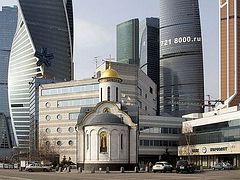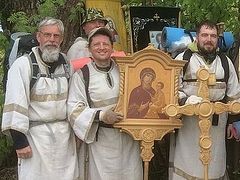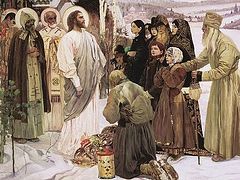What is Holy Rus’? Is it some historical/geographical concept that belongs to past eras or an ideal we are expected to strive for? Does Holy Rus’ exist today? We asked some Russian priests these questions, and what meaning the concept of Holy Rus’ has for them personally.
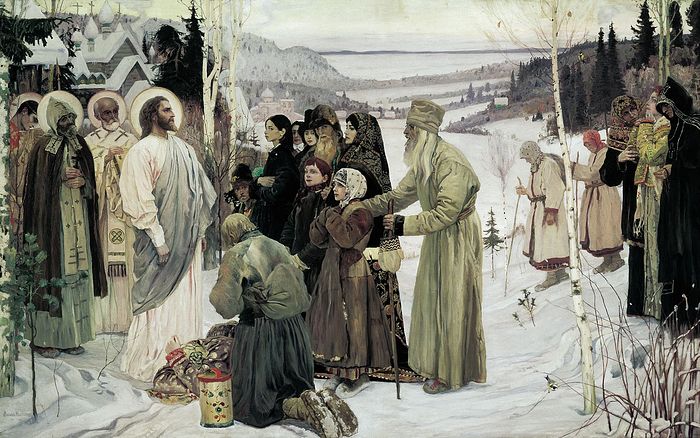 “Holy Rus’” by the artist Mikhail Nesterov
“Holy Rus’” by the artist Mikhail Nesterov
If Rus’ has a right to be, then only as Holy Rus’ and not otherwise
For me Russia is still Holy Rus’. It is neither the Rus’ of megastores and advertising blazing with powerful lights, nor the Rus’ of skyscrapers that proudly tower up and entertainment complexes that drain you of your spirit. It is the Rus’ of magnificent cathedrals and churches that are dear to your heart, monasteries that console your soul, and wonderworking relics, holy God-pleasers and pure prayers, the Rus’ of cross processions and standing in prayer, self-sacrifice to your neighbors and faithfulness to Orthodoxy. Only this Russia exists for me, and there can be no other Russia. And if godlessness, or consumerism, or love for comfort emerge, as they are doing now, these are just temporary illnesses which come and go; while Holy Rus’ will remain.
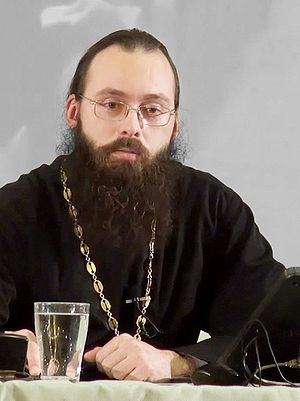 Priest Valery Dukhanin The main idea that our ancestors nurtured and that many generations of Russian people held in reverence—our national idea—is holiness. Neither eloquent scholarship, nor refined culture, nor the building of an earthly Olympus and the “extravagant expectations” of economical miracles, to say nothing of passions and sensuality; but holiness, life according to the commandments of Christ and decrees of the God-bearing Fathers, reverence before those who have reflected the image of Christ in their lives—this is what the aspiration of the Russian people has always been.
Priest Valery Dukhanin The main idea that our ancestors nurtured and that many generations of Russian people held in reverence—our national idea—is holiness. Neither eloquent scholarship, nor refined culture, nor the building of an earthly Olympus and the “extravagant expectations” of economical miracles, to say nothing of passions and sensuality; but holiness, life according to the commandments of Christ and decrees of the God-bearing Fathers, reverence before those who have reflected the image of Christ in their lives—this is what the aspiration of the Russian people has always been.
And if our modern Russian people didn’t feel awe for holiness, our monasteries wouldn’t have attracted so many pilgrims, patient supplicants wouldn’t have lined up in the thousands to venerate the relics of St. Sergius of Radonezh and Seraphim of Sarov, Blessed Matrona of Moscow and St. Xenia of St. Petersburg. Like our forebears many centuries ago, we light candles in front of icons in our days, realizing our spiritual weakness and commending our lives into the hands of the Savior and the Mother of God, Sts. Nicholas the Wonderworker and Panteleimon the Healer. And we should note that the Lord answers people’s prayers.
Holy Rus’—there is something so dear, something sacred, something cherished in this. Those who do not live by it will not see it. This is revealed as you gain more spiritual experience. But my personal conviction is as follows: If Rus’ has a right to be, then only as Holy Rus’ and not otherwise.
“O Holy Rus’, preserve the Orthodox faith as in it is your confirmation!”
Holy Rus’ is a Cinderella in the modern world
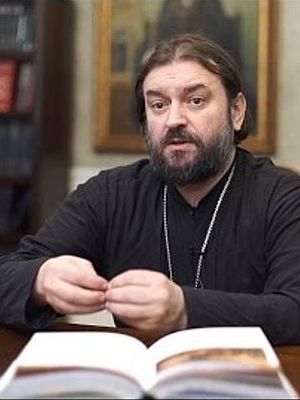 Archpriest Andrei Tkachev Today Holy Rus’ exists, but as a Cinderella, an unloved daughter. The contemporary world is like a stepmother, who cherishes and nurses its own daughters, namely pride, love of money, and depravity, while the neglected precious stepdaughter is the Church of God, which we find in Holy Rus’. It is genuine Christianity that is confessed by a tiny minority. Besides, this minority is not concentrated (like a ghetto, like salt in a salt shaker) but dispersed in society (like a food additive). This “salt” salts the whole body of the Russian state and the Russian nation by itself, yet it is either ignored or despised by the majority of Russian people, and indeed some violently try to drive it away. That is, it is ranked as an enemy that ought to be banished. The Church Militant continues its march through history; and this genuine holiness has not disappeared in our nation. But in order to survive it has withdrawn into itself, “dressed in simple clothing” and disguised itself, because now it is so detested by the modern world.
Archpriest Andrei Tkachev Today Holy Rus’ exists, but as a Cinderella, an unloved daughter. The contemporary world is like a stepmother, who cherishes and nurses its own daughters, namely pride, love of money, and depravity, while the neglected precious stepdaughter is the Church of God, which we find in Holy Rus’. It is genuine Christianity that is confessed by a tiny minority. Besides, this minority is not concentrated (like a ghetto, like salt in a salt shaker) but dispersed in society (like a food additive). This “salt” salts the whole body of the Russian state and the Russian nation by itself, yet it is either ignored or despised by the majority of Russian people, and indeed some violently try to drive it away. That is, it is ranked as an enemy that ought to be banished. The Church Militant continues its march through history; and this genuine holiness has not disappeared in our nation. But in order to survive it has withdrawn into itself, “dressed in simple clothing” and disguised itself, because now it is so detested by the modern world.
Holy Rus’ does not fit into any administrative-territorial boundaries or timeframe
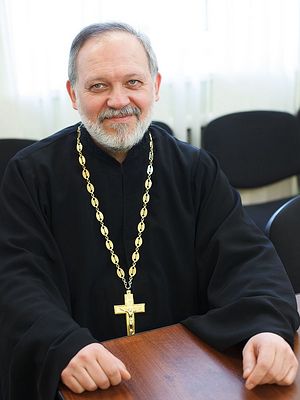 Priest Alexander Dyachenko I want to believe that Holy Rus’ exists in reality. Clearly, this image is most likely a metaphor. Holy Rus’ has never fitted into any real administrative-territorial boundaries or timeframe. For me Holy Rus’ exists beyond time, beyond any national identity and beyond any link to a certain place. For me Holy Rus’ means the holy Child Martyr Gabriel of Bialystok, Righteous John the Russian, St. Job of Pochaev, Grand Duchess Elizabeth Romanov, Grand Prince Alexander Nevsky, St. Silouan the Athonite and St. Herman of Alaska, Holy Hierarch John of Shanghai and a host of other names that gladden my heart. I really exist alongside these people, beginning each day with prayer to them; I also live in my time in a real urban village. And I rejoice at the fact that there are some people among its residents who feel a need to go to church and pray at the Vigil service. Though small in number, they exist and they are the Holy Rus’ of my time too.
Priest Alexander Dyachenko I want to believe that Holy Rus’ exists in reality. Clearly, this image is most likely a metaphor. Holy Rus’ has never fitted into any real administrative-territorial boundaries or timeframe. For me Holy Rus’ exists beyond time, beyond any national identity and beyond any link to a certain place. For me Holy Rus’ means the holy Child Martyr Gabriel of Bialystok, Righteous John the Russian, St. Job of Pochaev, Grand Duchess Elizabeth Romanov, Grand Prince Alexander Nevsky, St. Silouan the Athonite and St. Herman of Alaska, Holy Hierarch John of Shanghai and a host of other names that gladden my heart. I really exist alongside these people, beginning each day with prayer to them; I also live in my time in a real urban village. And I rejoice at the fact that there are some people among its residents who feel a need to go to church and pray at the Vigil service. Though small in number, they exist and they are the Holy Rus’ of my time too.
There is a modest obelisk in the center of our village with the names of those who laid down their lives for the freedom of their nation and their land. For me these names are as holy as those of the heroes who in their time resisted Batu Khan or Emperor Napoleon Bonaparte. Those people lived here, in my country, and for them it was priceless. Those who built, multiplied its wealth, raised their children, cherished and protected with the name of God on their lips—for me they are all citizens of Holy Rus’.
Holy Rus’ is a world that continues to live
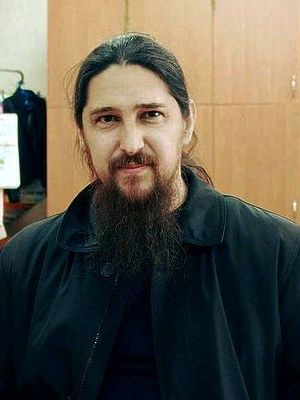 Priest Dimitry Shishkin Beyond all doubt, Holy Rus’ exists! First and foremost, it is the multitude of Orthodox people who in one way or another lived in or were in contact with our Russian land, wove its history, language, traditions and culture. The multitude of people who to the best of their ability served God in this life on earth with zeal and self-denial, endured to the end, and now dwell with God. Those people weren’t necessarily Slavs by blood, and indeed some lived before the very concept of Rus’ had appeared. But through their faith, their contact with our land, preaching among the peoples that inhabited it, they were preparing and building the special realm that we now call Holy Rus’.
Priest Dimitry Shishkin Beyond all doubt, Holy Rus’ exists! First and foremost, it is the multitude of Orthodox people who in one way or another lived in or were in contact with our Russian land, wove its history, language, traditions and culture. The multitude of people who to the best of their ability served God in this life on earth with zeal and self-denial, endured to the end, and now dwell with God. Those people weren’t necessarily Slavs by blood, and indeed some lived before the very concept of Rus’ had appeared. But through their faith, their contact with our land, preaching among the peoples that inhabited it, they were preparing and building the special realm that we now call Holy Rus’.
This realm is real and indestructible as is the unity of these people’s souls with God and with each other in the Heavenly Kingdom. And their flesh (something we call holy relics) sanctified our land. And not only relics, but even the objects that these people used in their lives on earth, in their service to God and other people… All their words, acts and precepts we know of are also sacred to us and are a cultural aspect of Holy Rus’. This idea agrees with the opinion of the Holy Fathers that “our physical things that are dedicated to God are spiritual” (from the Philokalia, Vol. 4, 35, 4). And it is important for all of us to remember this all-encompassing meaning of Holy Rus’ that embraces the spiritual, mental and physical life of our nation. Because today, many Russian people tend to forget the significance of the concept of fatherland which is inseparable from that of Holy Rus’. They forget that the idea of fatherland not only embraces the historical space of Russia but spreads further afield, knowing no boundaries, no geographical, political, or ethnic divisions. Therefore, wherever Russian people lived or live, wherever fate has brought them and where they have preserved and still uphold the Orthodox faith, their language, culture and way of life, where they attracted and attract Divine grace by their good, pious life—whether it is Belarus, Ukraine, France, Germany, Australia, South America or North Africa—there exist our fatherland and Holy Rus’.
And all those who accept the good tidings of the Crucified and Resurrected Lord, Russian life and culture in agreement with the Orthodox faith from these people, become partakers of Holy Rus’ to one degree or another.
It is impossible to destroy or denigrate it because it is a spiritual phenomenon. If only we could appreciate this treasure, keep and multiply it ourselves, if we could carry on the good and holy mission of our forefathers of building life upon the strong foundation of the Orthodox faith. Then Holy Rus’ will be with us and in us; and we will be its keepers, continuers and builders. Because Holy Rus’ is not something finished and stalled in development. Holy Rus’ is a world that continues to live; it is a world, partakers of which we can and must be. It is a special gift of God to our people. It is a gift of unique identity and spiritual, language and cultural originality, blessed by the grace of God. And we surely must keep and multiply this gift with the help of God.

